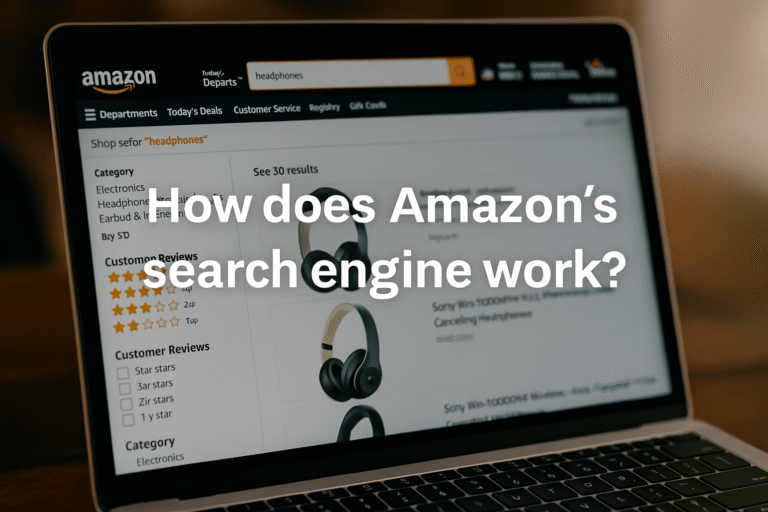Amazon’s search engine is a critical part of the platform’s success. With millions of products and global customers, the system needs to deliver the right results instantly. This is where Amazon’s A9 algorithm comes in a highly optimized, proprietary search engine that powers every product query on the platform.
If you’re an eCommerce store owner or developer, understanding how Amazon search works can help you rethink your own product discovery system. In this blog, we’ll take you through how the Amazon search engine functions, what technologies drive it, and whether it’s worth replicating or competing with.
How Does the Amazon Search Engine Work?
Amazon’s search engine is fundamentally a product-focused ranking algorithm. It doesn’t just try to understand what the customer types it also tries to predict what they’ll want to buy. Here’s a breakdown of its technical components:
1. Keyword Matching and Parsing
At the core, Amazon still uses keyword matching, but not in a traditional sense. A9’s search engine tokenizes user input and compares it against indexed product listings. However, this is just the starting point. The system also accounts for synonyms, category relevance, and even historical user behavior.
2. Ranking Algorithm (A9/A10)
Amazon’s A9 algorithm (and its evolving A10 variant) ranks products based on:
-
Click-through rate (CTR)
-
Conversion rate
-
Sales velocity
-
Customer reviews and ratings
-
Pricing and availability
- Relevancy of title, description, and backend keywords
In simple terms, products that are clicked more, convert better, and get good reviews are more likely to show up higher even if they don’t have perfect keyword matches.
3. Personalization and Behavior Signals
Amazon uses behavioral data at scale. Every click, scroll, and purchase contributes to how it tailors results for each customer. This makes it both a semantic search engine and a machine learning-driven recommendation system.
For instance, if you’ve searched for wireless headphones and previously bought electronics, Amazon may prioritize high-rated tech brands in your results.
4. Search Filters and Facets
After the initial search, Amazon gives users ways to refine results through filters like:
-
Brand
-
Average customer rating
-
Delivery options
-
Price range
These are powered by faceted search architecture, allowing dynamic filtering without reloading the page.
5. Ads and Sponsored Products
A significant part of what appears in Amazon’s search results is paid content. Sponsored products are ranked using both relevance and bidding. This creates a hybrid search experience, mixing organic and paid results—a key revenue model for Amazon.
Is Amazon’s Search Engine Worth Emulating?
Amazon’s search engine is one of the most advanced commercial systems ever built. It integrates keyword relevance, real-time behavioral data, machine learning models, and massive indexing infrastructure.
However, replicating Amazon’s engine is not only technically complex but also cost-prohibitive for most businesses. It requires:
-
Scalable vector infrastructure
-
Continuous behavior analysis
-
Advanced language modeling (NLP)
-
Deep integration with sales metrics
Moreover, Amazon’s engine is tailored to Amazon’s own ecosystem it may not translate well to your unique business model or catalog.
Are There Better Alternatives?
While Amazon’s search engine is powerful, it isn’t always ideal for smaller or mid-size eCommerce platforms. Many users find its over-reliance on ads and bias toward big sellers frustrating. This opens the door to smarter, more flexible alternatives.
If you’re looking to provide personalized, semantic, and conversion-focused search without building a search engine from scratch, there are purpose-built solutions available.
Why Expertrec Is a Better Choice for eCommerce Search
Expertrec is a no-code, AI-powered search engine built specifically for online stores. While it doesn’t try to copy Amazon’s massive infrastructure, it intelligently applies the most useful parts of it—tailored to your store’s needs.
Here’s what sets Expertrec apart:
Semantic Search with Vector Embeddings
Expertrec uses natural language processing and vector embeddings to understand the user’s intent. This allows the engine to return relevant results, even when exact keywords don’t match.
Fast, Customizable Faceted Search
Faceted navigation lets users filter results dynamically. Expertrec allows full control over which filters appear—based on your catalog structure and business logic.
Behavior-Based Ranking
The system learns from clicks, cart additions, and purchases to re-rank search results in real-time—just like Amazon, but on a manageable scale.
Multilingual and Image Search Support
Run a global store? Expertrec supports multi-language product catalogs and even image-based search, helping users find products using pictures instead of text.
Easy Integration and No-Code Setup
Unlike building a search engine in-house, Expertrec integrates with platforms like Shopify, WooCommerce, Magento, and BigCommerce with minimal effort.
Final Thoughts: Smarter Search Without Complexity
Amazon’s search engine is a benchmark in retail tech but replicating it isn’t practical for most businesses. What you need is a scalable, intelligent search solution tailored to your catalog and customers.
Expertrec gives you that power without needing a team of engineers. It combines semantic search, fast indexing, behavior tracking, and customizable design all with a simple, user-friendly interface.
If you’re ready to move beyond basic keyword search and deliver a more personalized, high-converting shopping experience, Expertrec is the smart choice.
FAQs About Amazon’s Search Engine and Expertrec
It’s the algorithm that powers Amazon’s product search. It uses keywords, sales data, and personalization to rank products.
2. How is Expertrec different from Amazon search?
Expertrec is tailored for your store. It gives you semantic search, behavior tracking, and design flexibility—all without Amazon’s complexity.
3. Does Expertrec support advanced filters like Amazon?
Yes. You can add filters based on brand, category, availability, and more with full customization.
4. Is Expertrec faster than traditional search engines?
Yes. Expertrec uses FAISS and other vector-based indexing methods for lightning-fast results.
5. Can I personalize search results with Expertrec?
Absolutely. The engine adapts to shopper behavior, showing more relevant results over time.
6. Does Expertrec offer image-based search like Amazon?
Yes. You can let users upload images to find visually similar products.
7. Is it hard to integrate Expertrec into my store?
Not at all. With plugins for popular platforms and API access, setup is fast and seamless.
8. Is Expertrec suitable for multilingual stores?
Yes. It supports global catalogs and multilingual indexing for cross-border eCommerce.
9. Can I run promotions and influence rankings?
Yes. Expertrec allows business rules to promote featured or in-stock items.
10. How do I try Expertrec?
Visit expertrec.com to start a free trial and see the difference it makes.




